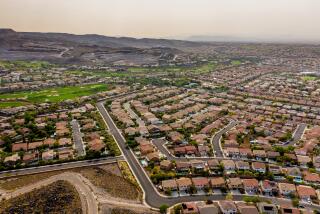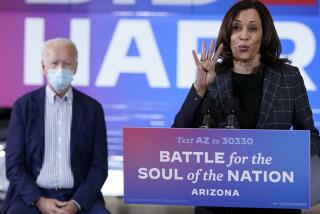Nevada isn’t a sure bet for Obama
RENO — Women are bowling in the middle of a downtown street. Men are climbing the sides of a high-rise hotel. As necks crane and bowling balls skitter into pins, a loudspeaker blares Bruce Springsteen’s “Glory Days.”
There is, it would seem, almost nothing this town wouldn’t do to revive a moribund gambling economy and bring back its glory days. For decades, casinos were the golden key to prosperity, luring in tourists, cranking out jobs around the clock and flooding the state treasury with a perpetual stream of cash.
Those days are over, and all the outdoor bowling championships and climbing walls installed to attract visitors probably won’t change that. The local economy is in shambles, done in by the double whammy of the national recession and the rise of Indian casinos in California. Unemployment is rampant.
That presents a serious challenge to President Obama as he tries to repeat his 2008 victory in Nevada, a key swing state then and now.
“I think he’ll have a harder time doing it this time, because we have so many people who are unemployed … and a lot of people blame the president,” said Reno Mayor Bob Cashell, a moderate Republican who doesn’t personally hold Obama responsible for his city’s plight.
But, he said, “when you’re the top dog, you get the blame, whether you did it or not.”
Washoe County, which includes Reno and neighboring Sparks, is the swing region of Nevada, and as such will play an outsized role in the presidential campaign between Obama and Republican Mitt Romney.
To the south, Las Vegas and surrounding Clark County is a Democratic and labor union stronghold. The rural counties that make up most of the rest of the state are overwhelmingly Republican.
That leaves Washoe, where Republicans have a slight registration edge and once had a near lock on elections. That is no longer the case, as Obama proved in 2008 by winning the county with 55% of the vote, matching his percentage statewide.
Washoe County “kind of holds the balance of power now,” said Dave Damore, a professor of political science at the University of Nevada, Las Vegas. “Basically, if a Republican loses Washoe County, they lose the state.”
That isn’t as true of a Democrat, as Bill Clinton demonstrated when he lost Washoe twice while winning the state by thumping opponents in the southern part. But a Republican blowout in Washoe would spell doom for any Democrat in a statewide race.
There have been no independent polls to show how the region is trending, but it seems fair to say that the economy has created a tough environment for any incumbent. By multiple measures, Nevada has been the hardest-hit state in the nation, with an unemployment rate that peaked at 13.7% in 2010 and remained the nation’s highest at 11.6% in May.
Nevada’s home foreclosure rate fell to No. 2 in the nation (behind Arizona) in March after 62 months in the top spot.
The Las Vegas area suffered the most, but Reno was not far behind. And economists and local officials say much of the damage to Reno-area tourism is probably permanent.
Unlike Las Vegas, with its international reputation, Reno has always been more of a regional attraction, drawing tourists from Northern California and the Pacific Northwest. With the advent of large, full-service Indian casinos in Northern California, many of those tourists have no reason to visit anymore.
Bill Eadington, an economics professor and director of the Institute for the Study of Gambling and Commercial Gaming at the University of Nevada, Reno, said his studies showed that gambling revenues from tourists in Reno declined by two-thirds between 1990 and 2010.
And, he added, “The business isn’t going to come back.”
Reno is trying hard to diversify its economy, and recently took a giant step forward with the announcement thatApple Inc.will build a 350-acre data center east of Sparks that will pump an estimated $1 billion into the region over 10 years. But that will have little impact before the November election.
Romney campaign staffers say they are confident that they can take advantage of voter malaise over the economy. They say Obama’s policies have stifled job creation in the region, especially in small business and mining.
“This president doesn’t seem to understand how massive government — how Big Brother hurting small business — is going to hurt the ability to grow in a place like Reno,” said Ryan Erwin, a campaign strategist in Nevada.
Erwin said that four years ago, “people were excited because they believed in hope and change, and what he [Obama] delivered was not what people hoped it would be.” This year, he said, “this is going to be a tough state; it’s going to be a battleground state. It’s going to be tough to win for anybody, but the advantages that Obama had in 2008 are gone.”
The Obama campaign insists that it is optimistic, despite the obvious challenges. One reason is Nevada’s demographics: The Latino population, which strongly favors Obama, has continued to grow since 2008, hitting 26.6% of the state’s residents in the 2010 census.
And Nevada, especially in the Reno area, has a tradition of independent-minded Republican voters, many of whom are relatively liberal on social and environmental issues. “I call them Sierra Club Republicans,” said Eric Herzik, a political science professor at UNR. “They’re driving a Volvo that says, ‘Keep Tahoe blue.’”
Still, Herzik said, Romney is a pretty good fit for Nevada Republicans, emphasizing economic issues and soft-pedaling social conservatism. And Nevada has a large Latter-day Saints population and relatively few evangelical voters who will be suspicious of Romney’s Mormon faith.
At Obama’s bustling campaign headquarters, volunteers are already staffing phone banks, trying to match what, by all accounts, was an awesome campaign organization in 2008, one that drew thousands of volunteers from California as well as Nevada.
Still, they acknowledge that this year will be tougher.
“This time, the Republican push-back is very strong,” said Melinda Fisher, 58, who said she got active in politics “after the Supreme Court let the corporations become people.” She says that even Democrats complain that the president hasn’t done enough to fix the economy.
“We just tell them, ‘Well, he’s tried, but he can’t get past the filibusters and the Republicans.’” At that point, she said, people sometimes hang up.
Another volunteer, Maria Velez, 68, said she has gotten an earful from economically strapped voters. “They’re losing their houses because of Obama; they’re losing their healthcare because of Obama,” she said, ticking off the complaints she hears. She tries to convince people that Obama isn’t at fault, but she worries about how it will play out in November.
“We try our best,” she said, “but I think it’s going to be difficult. There’s going to be apathy.”
Matthew Saylor might be considered a double victim of the recession. He lost his job and started a small business — a pet ambulance service — that failed, but doesn’t blame anyone in particular.
Saylor, 36, voted for Obama in 2008 and will vote for him again this year. As a gay man with an immigrant boyfriend, he is especially happy with Obama’s recent moves on gay rights and immigration. He also believes the president is stronger on the environment and healthcare. Still, he said, he admires Romney’s business acumen and could live with a Romney presidency.
Based on what he hears from people he talks to in Reno, he’s beginning to think that could happen.
“We all bought into the hope thing,” he said, speaking of Obama. “Six months ago, I believed he was going to win. Six months later, I have my doubts.”
One in a series of occasional stories on the states that will determine the next president.
mitchell.landsberg@latimes.com
More to Read
Start your day right
Sign up for Essential California for news, features and recommendations from the L.A. Times and beyond in your inbox six days a week.
You may occasionally receive promotional content from the Los Angeles Times.






